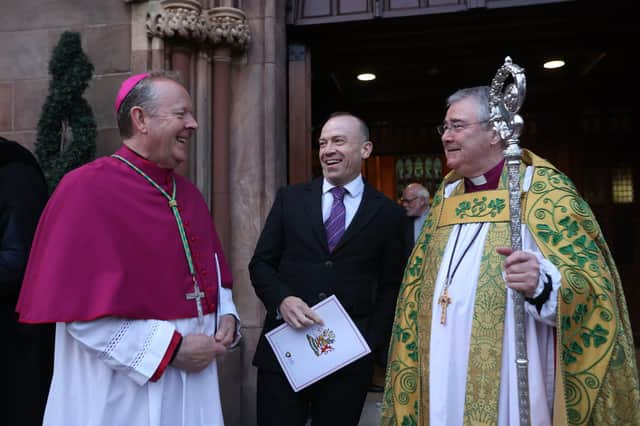Canon Ian Ellis: The king is a committed Anglican Christian who wants to protect diversity of the country


As a constitutional monarchy, it is parliament that governs in the UK, but in loyalty to the sovereign and, because of that close association between monarch and parliament, the monarch certainly has immense influence. However, it is an influence to be prudently and wisely used.
There are of course those people who wish to see the monarchy abolished and replaced with an elected presidency, and there are those in Northern Ireland who feel the monarchy simply belongs to another country. Arguments have been rehearsed especially in recent weeks for and against the monarchy but one of the important things about it, for me at least, is its religious aspect. The British monarch affirms the Christian faith, while also respecting other religious convictions. King Charles inherits the role of Supreme Governor of the Church of England and is represented at the Church of Scotland's General Assembly by his Lord High Commissioner. The monarchy thus witnesses to the importance of religious faith for people's lives in what today is a religiously very diverse nation.
Advertisement
Hide AdAdvertisement
Hide AdAddressing faith leaders last September, King Charles said: “I am a committed Anglican Christian, and at my coronation I will take an oath relating to the settlement of the Church of England. At my accession, I have already solemnly given – as has every sovereign over the last 300 years – an oath which pledges to maintain and preserve the protestant faith in Scotland.” However, he went on to add that he had always thought of Britain as a “community of communities” and that this had led him to understand that the sovereign has an additional duty, “less formally recognized but to be no less diligently discharged”, that is, the duty “to protect the diversity of our country, including by protecting the space for faith itself and its practice through the religions, cultures, traditions and beliefs to which our hearts and minds direct us as individuals”.
The spiritual dimension of the British monarchy is symbolised not only in the fact that it is Archbishop of Canterbury Justin Welby who performs the coronation but also, in a particularly solemn aspect of the service, in the anointing by him of the King and Queen.
In a special ceremony last March at the Church of the Holy Sepulchre in Jerusalem, the coronation oil was consecrated by Patriarch Theophilos III of Jerusalem and Anglican Archbishop in Jerusalem Hosam Naoum. After that ceremony, Archbishop Welby said: “Since beginning the planning for the coronation, my desire has been for a new coronation oil to be produced using olive oil from the Mount of Olives. This demonstrates the deep historic link between the coronation, the Bible and the Holy Land. From ancient kings through to the present day, monarchs have been anointed with oil from this sacred place.”
The monarchy represented in the Bible has its own chequered history which it is apt to recall at this time not least because monarchies, wherever they may be, go through both untroubled and troubled times. When the people of Israel settled in the Promised Land, having escaped from brutal captivity and slavery in Egypt around 1280BC, they did so as a tribal league, but the tribes were not highly organised in terms of national unity. For a time the people were ruled mainly by judges, until the tribes united to choose Saul to be their common king.
Advertisement
Hide AdAdvertisement
Hide AdThe judges were not judges as we know them today, but charismatic leaders of the clans. Yet when the Israelites faced the mighty Philistines, that system of governance was simply too disjointed to meet the challenge. For that reason they chose Saul as their king, to lead them in battle. He was followed by David and Solomon before the kingdom split, circa 922BC, into Judah in the north and Israel in the south. The history of Israel continued through times of greatness and times of crisis.
The point here is that the monarch was felt to be a necessary rallying figure and that is still true today, although in different ways from the experience of the biblical monarchy. We do view our monarch as a person who will convey a sense of national unity and stability in the midst of political turmoil, as well as a sense of continuity. In our modern age the wider Royal Family is at the centre of public attention and it is for that family to try also to convey to the people a real sense of stability. Of course, all families know strains and stresses but it is for the Royal Family to model, as much as it can and for all our benefit, the best way of dealing with such difficulties.
Our new King and Queen face a future that seems somewhat uncertain as far as the popularity of the monarchy is concerned. The future of the monarchy will, however, surely be well served by distinguishing itself in the public imagination from the cult of celebrity and, by contrast, retaining a clear vision of it being the vehicle through which secure stability, genuine spiritual devotion and charitable concern can be exemplified for one and for all.
• Canon Ian Ellis is a former editor of The Church of Ireland Gazette